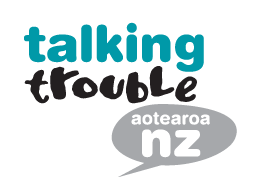About Us
TTANZ's speech-language therapists (SLTs) are passionate about improving New Zealand’s response to the speech, language and communication needs experienced by many children, youth and adults involved with care and protection, justice, mental health and behaviour services.
Our specialised, practical and energetic speech-language therapists provide clinical services, research, professional training and consultation, and deliver court-appointed Communication Assistance roles in legal settings.
The focus of all Talking Trouble's activities is the speech, language and communication needs of children, adolescents and adults who are involved with care and protection, justice, mental health or behaviour services.
Talking Trouble operates as a social enterprise/profit-for-purposes organisation where any profits generated after individuals carrying out work have been paid are used for pro-bono, training or research activities. No owner dividend is taken. Sally Kedge is the coordinator and director of Talking Trouble Aotearoa NZ (Talking Trouble) which was registered as a limited liability company in October 2015. Talking Trouble had until that time been a project with no official status as a company or charitable trust that had been started by Sally Kedge, Dr Linda Hand and Dr Clare McCann. Dr Hand and Dr McCann continue to be academic advisors to Talking Trouble and are engaged in some research projects that are carried out jointly between Talking Trouble and The University of Auckland.
Currently Talking Trouble is coordinated by Sally Kedge who contracts around 30 highly specialised and experienced speech-language therapists to carry out the following activities:
Court-appointed Communication Assistant roles in Youth, District and High Courts and Tribunals for witnesses or defendants who need assistance with understanding and participating in these settings, plus similar roles in other settings e.g. Family Group Conferences, Police interviews, Parole Board Hearings.
Workforce professional development and training.
Clinical speech-language therapy assessments and interventions.
Research and evaluation.
Consultation, e.g. working parties for Communication Assistants.
